The Butterflies of the World Foundation
A Non-
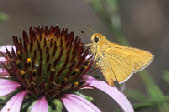
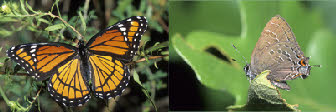
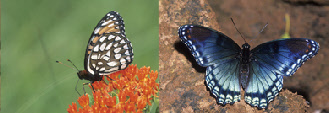
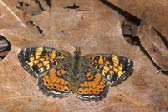

Common Buckeye
Junonia coenia, Hübner, (1822)
Subfamily Nymphalinae
Tribe Junoniini
Taxonomy
The family Nymphalidae is the largest butterfly family and includes about 6,000 species which are further divided up into 12 subfamilies. The common name for the family is the Brushfoots or Brushfooted Butterflies. This strange name is because the first pair of legs are significantly reduced, sometimes to mere stubs, and look like little brushes. Some of the most common and well known species are in this group such as the Monarch, Red Admiral, Blue Morpho and Painted Lady. Some of the longest lived butterflies are in this family with some species living over 10 months as adults. The Brushfoots are distributed worldwide, with the highest diversity found in the tropics. With this variety, there is also quite a difference in behavior, adult food choices and habitat preference from species to species.

Junonia coenia, captured by crab spider, Lexington Wildlife Management Area, Cleveland
County, Oklahoma, 23 September 2005 Ref #:
SP-

Junonia coenia, wing detail, specimen from Minot State University collection, North
Dakota Ref
#: PA-
All photographs, artwork, text and website design are the property of The Butterflies of the World Foundation (unless otherwise stated) and are protected under national and international copyright laws. Photographs, artwork or text on this website may not be reproduced in any way without prior written consent of The Butterflies of the World Foundation.
Junonia coenia, Lexington Wildlife Management Area, Cleveland County, Oklahoma, 27
October 2005 Ref
#: I-

Junonia coenia, Lexington Wildlife Management Area, Cleveland County, Oklahoma, 11
July 2009 Ref
#: I-

Junonia coenia, Lexington Wildlife Management Area, Cleveland County, Oklahoma, 29
September 2005 Ref
#: I-

Junonia coenia, Lexington Wildlife Management Area, Cleveland County, Oklahoma, 27
October 2005 Ref
#: I-

Junonia coenia, Lexington Wildlife Management Area, Cleveland County, Oklahoma, 27
October 2005 Ref
#: I-

Junonia coenia, Pontotoc Ridge Preserve, Pontotoc County, Oklahoma, 25 September
2010 Ref
#: I-

Junonia coenia, Pontotoc Ridge Preserve, Pontotoc County, Oklahoma, 25 September
2010 Ref
#: I-

Junonia coenia, Camp McFadden, Kaw Lake, Kay County, Oklahoma, 8 October 2010
Ref
#: I-
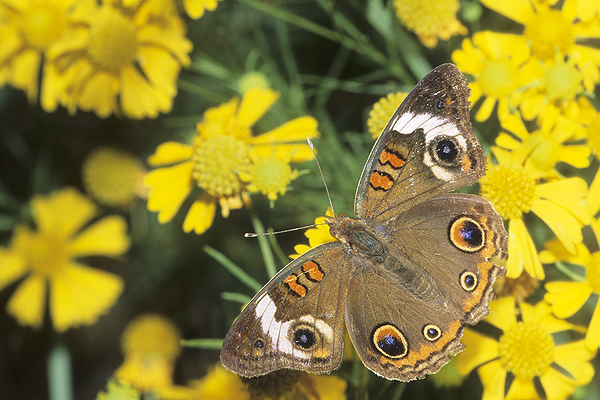
Junonia coenia, McGee Creek Wildlife Management Area, Atoka County, Oklahoma, 12
October 2011 Ref
#: I-
General Information:
Junonia coenia belongs to the subfamily Nymphalinae. Its range is from the southern United States and north along the coasts to central California and North Carolina; south to Bermuda, Cuba, Isle of Pines, and southern Mexico. Adults from the souths first brood migrate north in late spring and summer to temporarily colonize most of the United States and parts of southern Canada. Its preferred habitat includes open, sunny areas with low vegetation and some bare ground.
Lifecycle:
The larval food source includes plants from the snapdragon family such as snapdragon, Antirrhinum sp., and toadflax, Linaria sp., as well as the plantain family including plantains, Plantago sp., and the acanthus family including ruellia, Ruellia nodiflora. Males perch during the day on low plants or bare ground to watch for females, flying periodically to patrol or to chase other flying insects. Females lay eggs singly on leaf buds or on upperside of host plant leaves. Caterpillars are solitary and eat leaves.

Junonia coenia, Lexington Wildlife Management Area, Cleveland County, Oklahoma, 29
September 2005 Ref
#: I-

Junonia coenia, Lexington Wildlife Management Area, Cleveland County, Oklahoma, 17
October 2006 Ref
#: I-

Junonia coenia, Lexington Wildlife Management Area, Cleveland County, Oklahoma, 9
May 2012 Ref
#: I-

Junonia coenia, Pontotoc Ridge Preserve, Pontotoc County, Oklahoma, 19 May 2012
Ref
#: I-

Junonia coenia, Lexington Wildlife Management Area, Cleveland County, Oklahoma, 16
May 2012 Ref
#: I-

Junonia coenia, larva, Pontotoc Ridge Preserve, Pontotoc County, Oklahoma, 19 May
2012 Ref
#: I-

Junonia coenia, Lexington Wildlife Management Area, Cleveland County, Oklahoma, 16
May 2012 Ref
#: I-